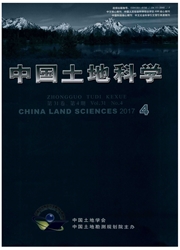

 中文摘要:
中文摘要:
为跟踪世界科技的最新进展,解决中国快速发展过程中所面临的关键性和突出性重大问题,中国政府开展了一系列重大科技专项计划,如科技支撑计划等。气候变化、地表过程、土地利用、自然灾害是近年来人文一经济地理学者参与最广、研究最深的领域,在地表过程的人文驱动机制、资源环境承载能力评价等方面取得了重大进展和突破,为政府编制规划、开展环境外交等提供了科学依据。本文分析了上述研究计划的基本概貌,以及人文一经济地理学者在其中承担的主要任务。从个人终端消费导向的碳足迹研究、人文地理过程的系统动力学研究、土地利用重点问题咨询与决策、灾区资源环境承载能力评价等方面总结了人文一经济地理学在其中做出的主要贡献和社会影响。
 英文摘要:
英文摘要:
The Chinese government launched a series of science and technology research programs to keep pace with the latest progress in world sciences research and solve the key problems emerging in China' s rapid devel- opment. Climate change, land surface processes, land use and natural disasters are the academic domains which human-economic geographers mostly devoted themselves to further research. Some important progress in the hu- man-driven mechanism of land surface process and resource environment carrying capacity evaluation has of- fered a scientific basis for the government' s planning and environmental diplomacy. This paper reviews the ma- jor tasks undertaken by human-economic geographers and summarizes the major contributions and social impact of human-economic geography, such as the final consumption oriented research on carbon footprint, system dy- namics of human geographical processes, key issues in land use decision making, and resource environment car- rying capacity evaluation for disaster-hit areas.
 同期刊论文项目
同期刊论文项目
 同项目期刊论文
同项目期刊论文
 期刊信息
期刊信息
